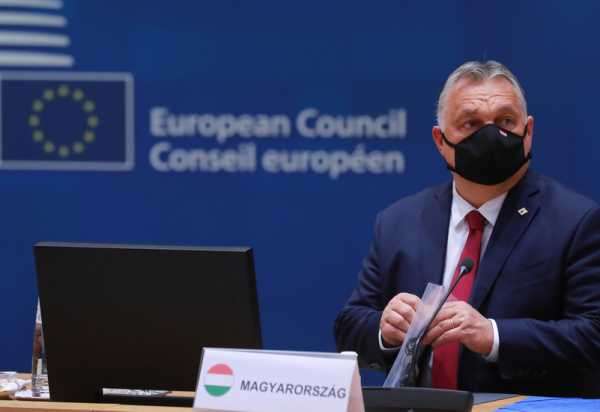
Is Viktor Orban really back in the family fold of the EU? (Photo: Council of the European Union)
It’s already become a cliche to argue that European foreign and security policy matured more over the last weekend than during the past decade.
What was unrealistic a week ago — a strong, joint European position on the hardest possible sanctions on Russia, including Nord Stream 2, SWIFT and freezing the assets of the Russian central bank—is now a hard, cold reality.
The shift also has been seen in Hungary – whose prime minister Viktor Orbán has traditionally been considered Vladimir Putin’s most obvious trojan horse in the EU and in Nato.
Orban supported all the EU sanction measures – after some small attempts to delay – and condemned the Russian invasion of Ukraine.
Over the past couple of days, it’s become the mantra of Hungarian foreign policy that the country shares all joint European positions, irrespectively what those positions may be. Orbán even supported the EU decision on the delivery of lethal weapons to Ukraine.
And Hungary is now keeping a low profile. It’s trying to shake off its image as the Russia-pleasing troublemaker.
Genuine U-turn?
Is a genuine U-turn in Hungarian foreign policy unfolding in front of our very own eyes? Could the shockwaves sent by the Russian aggression domesticate Orbán, practically overnight?
No. Take a closer look at the country and its foreign policy, and one sees a protracted balancing, not a U-turn.
Government-controlled media outlets and social media trolls still echo Russia-friendly narratives and disinformation in Hungary. The country is the only one among the four Visegrad States that refused, itself, to provide military aid to Ukraine. The Czech Republic, Poland and Slovakia committed considerable military support for Kyiv.
Furthermore, the government of Orbán also prohibited the use of Hungarian transport routes to deliver military aid to Ukraine.
You could say that Orbán has shown he’s not ready to break even a single tie forged with Putin over the years, in spite of the clear demand of both the Hungarian opposition and the anti-war protests on Budapest’s streets.
He refused to reconsider the controversial Paks II nuclear power plant construction project, just as he refused to follow the Czech government’s call to leave the Russia-controlled International Investment Bank (IIB).
The IIB moved its headquarters to Budapest in 2019 and has been widely regarded as a security risk, with accusations the institution providing safe haven for covert Russian intelligence activities.
And Orbán would not be in the position to make a foreign policy U-turn, even if he wanted, for two good reasons.
Mea culpa impossible
First, he cannot admit in the election campaign that his Russia-policy over the past 12 years has been a huge, strategic mistake.
Among his hardcore supporters, Orbán is believed to be infallible. Destroying this myth would not only cause confusion in his electoral base but could easily pose further uncomfortable questions.
If cosying up to autocrats was a failure, his confrontational approach vis-á-vis the European Union and other Western partners might now be seen to have been unwise as well.
The whole worldview of Fidesz, which is the political party Orban leads, is at stake.
In the past, Orbán was indeed able to master neck breaking ideological and policy turns.
But not over such a short period of time, without any preparatory work —and in the middle of an election campaign.
Second, a genuine U-turn of Hungarian foreign policy is impossible and unimaginable without a U-turn in domestic policy.
Although in the coming months the EU will be preoccupied with keeping united on its policy toward Russia, the points of conflict between the EU and Hungary relations won’t simply vanish.
To resolve the big questions — what will happen with the suspended Covid recovery fund and the rule of law mechanism — Orbán would need to re-democratise his regime.
For an authoritarian strongman and kleptocrat, this is impossible.
As for keeping close and cordial ties with Russia and China, he’s likely to persist with that path. After all, it offered Orbán important leverage over Western partners and the EU.
So much of Orban’s modus operandi is to create the impression of available strategic options that may allow him to sustain his regime should Hungary, one day, leave the EU.
That implicit threat won him many battles in the EU, protecting him from genuine sanctions for years.
Hungary’s troublesome foreign policy and his autocratisation go hand-in-hand. Orbán can’t have one without the other.
There is no hope for a genuine U-turn in Hungarian foreign policy while prime minister Orbán is in power in Budapest.
Source: euobserver.com



